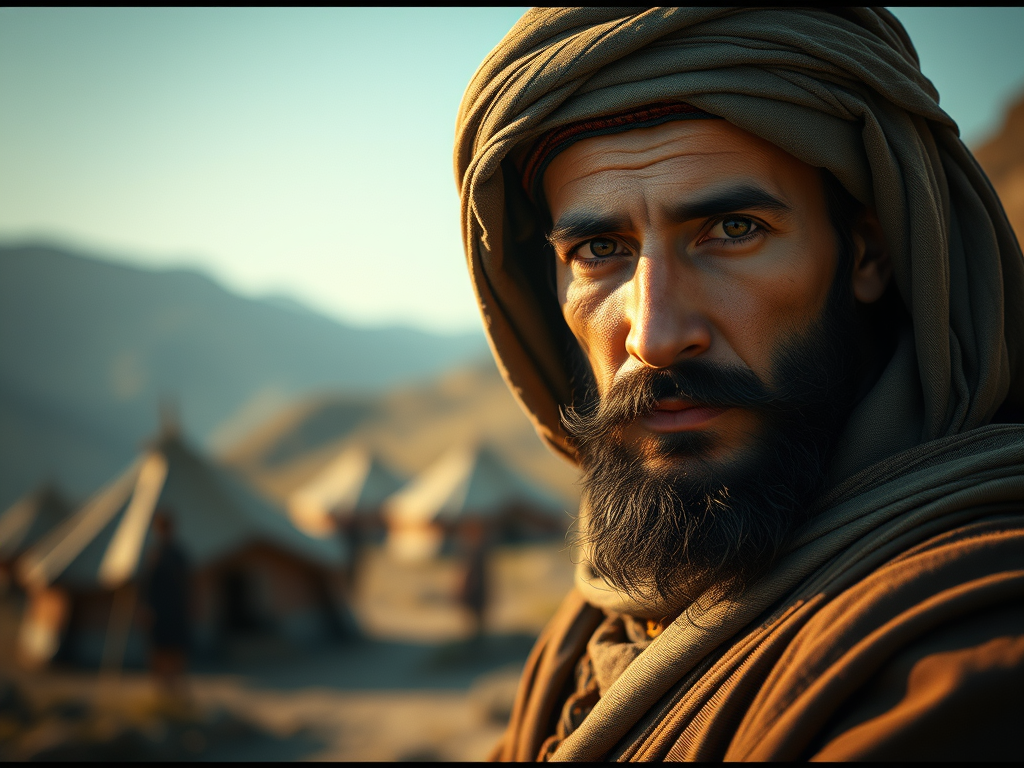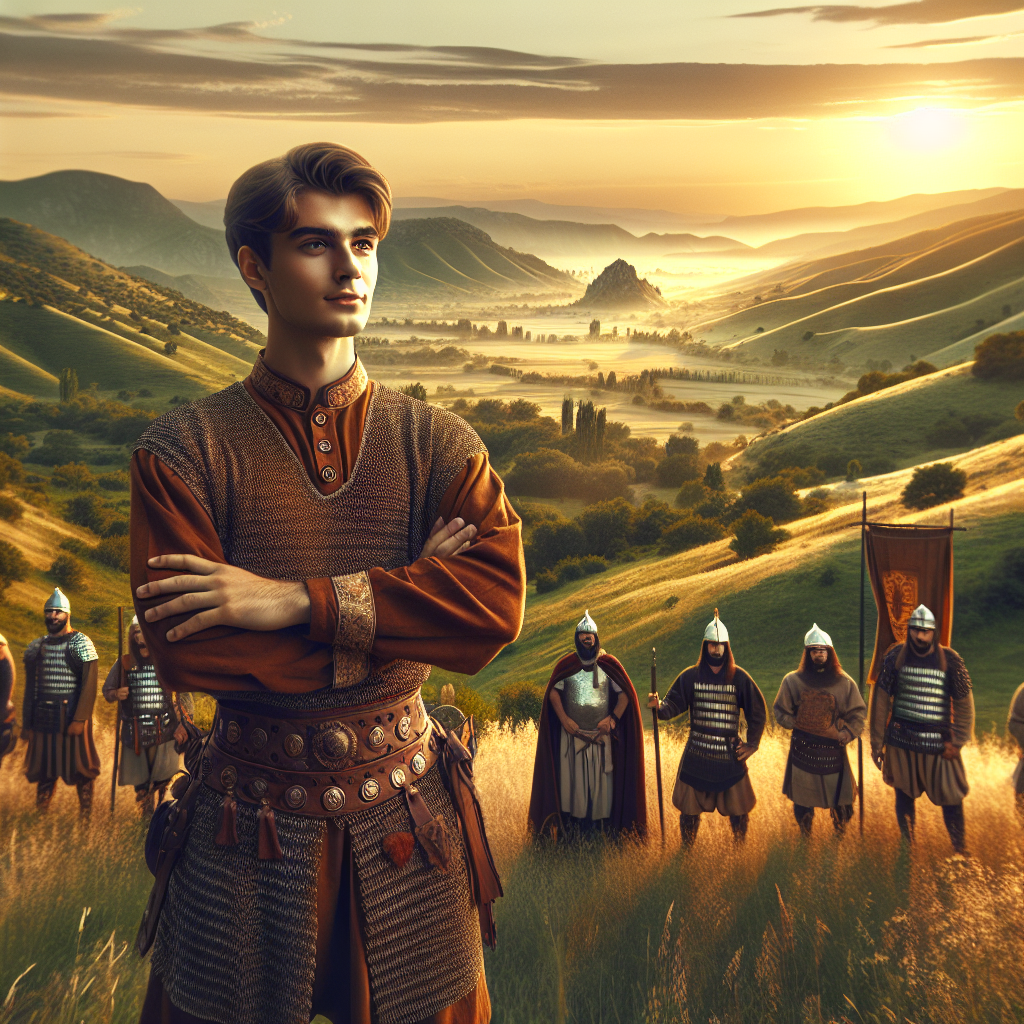Osman Ghazi, a name that echoes through the annals of history, is celebrated as the founder of the Ottoman Empire. His early life set the stage for the rise of one of the world’s most formidable empires. For history enthusiasts, understanding the nuances of his formative years offers invaluable insight into his leadership and the legacy he left behind.
Birth and Family Background
In the year 1258 CE, Osman Ghazi was born into the prominent Kayi tribe, a branch of the Oghuz Turks. His father, Ertugrul Ghazi, was a respected leader celebrated for his valor and keen strategic mind. The Kayi tribe, known for their nomadic lifestyle, played a crucial role in molding Osman’s character. The tribe’s culture emphasized resilience and adaptability, traits that would later define Osman’s leadership.
Ertugrul’s lineage carried immense significance as he had skillfully navigated his tribe through the turbulent landscapes of Anatolia. His reputation as a leader who embraced both the sword and the pen laid a solid foundation for Osman. The cultural values of the Kayi tribe, with their emphasis on loyalty and honor, deeply influenced young Osman, instilling in him a strong sense of justice and duty.
The nomadic influences on his upbringing taught Osman the importance of mobility and tactical flexibility. Living in a period marked by constant territorial shifts, Osman’s early exposure to the complexities of tribal politics and alliances served as a practical education in governance and strategy.

Influence of Ertugrul Ghazi
Ertugrul Ghazi’s leadership and military prowess left a lasting impact on Osman. Known for securing key territories and forging strategic alliances, Ertugrul was a mentor who demonstrated the power of visionary leadership. His achievements in expanding the Kayi tribe’s influence in Anatolia were both a precedent and a challenge for Osman.
Ertugrul’s values and vision profoundly shaped Osman’s early life. He taught his son the virtues of courage, patience, and the importance of preserving the tribe’s identity amidst external pressures. Under Ertugrul’s guidance, Osman learned to balance the sword and diplomacy, equipping him with the skills needed to lead his people.
The lessons of strategy and leadership imparted by Ertugrul were pivotal in Osman’s development. These teachings went beyond mere combat tactics; they instilled a robust framework for thinking critically and strategically, skills essential for any leader. Through his father’s tutelage, Osman gained the courage to dream of a larger realm for the Kayi tribe, setting the stage for his future endeavors.
Osman’s Early Military Experiences
Osman Ghazi’s early military experiences were critical in honing his skills as a warrior and leader. He actively participated in skirmishes against the Byzantine Empire and various local rivals, gaining invaluable experience on the battlefield. These encounters were more than mere conflicts; they were opportunities for Osman to test his mettle and leadership capabilities.
Through these early challenges, Osman developed not only his warrior skills but also his strategic acumen. He learned the importance of timing, terrain, and alliance-building, which later defined his successful campaigns. These experiences solidified his reputation among his peers as a leader capable of guiding his forces to victory.
In addition to his military engagements, Osman forged important alliances and friendships. These relationships proved crucial in his later conquests, offering both military support and political leverage. The network he built during these early years became a foundational element in his quest for expansion and dominance.
The Political Landscape of 13th-Century Anatolia
During the 13th century, Anatolia was a region marked by political upheaval and shifting allegiances. The decline of the Seljuk Empire created a power vacuum, leading to the emergence of small Turkic states vying for dominance. This turbulent environment provided Osman with both challenges and opportunities.
The power vacuum left by the Seljuks allowed ambitious leaders like Osman to assert their influence. With multiple factions striving for control, Osman strategically positioned himself to capitalize on these shifts in power. His ability to read the political landscape and adapt accordingly was key to his success.
Amidst these struggles for dominance, Osman’s strategic positioning became evident. He skillfully navigated alliances and rivalries, ensuring that the Kayi tribe maintained its autonomy and influence. His foresight in leveraging the political environment laid the groundwork for his later achievements in state-building.
Osman’s Vision for an Independent State
Osman Ghazi’s vision for an independent state was both ambitious and prophetic. Central to this vision was a dream he reportedly had, where a crescent moon grew over the world, symbolizing the rise of his future empire. This dream fueled his determination to establish a strong and independent state for the Kayi tribe.
His ambition to create a thriving state was evident in his early moves to expand territory. Osman’s efforts to secure key regions, such as Bithynia, demonstrated his commitment to establishing a foothold that would support his long-term goals. These early territorial expansions were crucial steps in realizing his vision.
Osman’s strategic mindset and unwavering determination were vital in transforming his dream into reality. By focusing on creating a cohesive and united state, he laid the essential foundations for what would become the Ottoman Empire. His ability to articulate and pursue such a vision distinguished him as a leader of extraordinary foresight.
Founding of the Ottoman Empire
The establishment of the Ottoman Empire marked a pivotal moment in history, with Osman Ghazi at its helm. Key early victories, such as the conquest of fortresses like Kulaca Hisar, laid the foundation for the empire’s expansion. These triumphs solidified Osman’s leadership and demonstrated his capability as a state builder.
Under his leadership, the Ottoman state formally began in 1299 CE. This transition from tribal leadership to the founding of a state highlighted Osman’s evolution as a leader. He adeptly balanced traditional tribal values with the needs of a burgeoning empire, ensuring stability and growth.
Osman’s leadership and vision during this formative period were instrumental in shaping the future of the Ottoman Empire. His ability to unite diverse peoples under a common banner, coupled with his strategic acumen, set the stage for centuries of Ottoman influence and prosperity.
Read More :: Empire Osman Ghazi’s Ancestry and the Oghuz Turks’ Enduring Legacy
Conclusion
Osman Ghazi’s early life was instrumental in shaping the trajectory of the Ottoman Empire. His experiences, from his familial influences to his early military engagements, provided him with the tools needed to transform his dreams into reality. The legacy of his vision and leadership continues to resonate in history, offering valuable lessons for leaders and history enthusiasts alike.
For those interested in exploring further, numerous resources are available detailing the history of Osman Ghazi, the foundations of the Ottoman Empire, and the political landscape of 13th-century Anatolia. These insights not only enhance our understanding of a pivotal historical figure but also offer timeless lessons in leadership and vision.
External Links for Further Reading:
- Osman Ghazi: Founder of the Ottoman Empire
- Ertugrul Ghazi and the Kayi Tribe
- The Ottoman Empire’s Early Conquests
- Political Landscape of 13th Century Anatolia
- Seljuk Empire Decline and Osman’s Rise
Here are a few books on Osman Ghazi, the Ottoman Empire, and related historical themes available on Amazon that may interest you:
- Osman’s Dream: The History of the Ottoman Empire
- Author: Caroline Finkel
- Link: Osman’s Dream
- The Ottoman Empire: A Short History
- Author: Suraiya Faroqhi
- Link: The Ottoman Empire: A Short History
- The Rise and Fall of the Ottoman Empire
- Author: Charles River Editors
- Link: The Rise and Fall of the Ottoman Empire
- Ertugrul Ghazi: The Real Story Behind the Founder of the Ottoman Empire
- Author: Zada Haj
- Link: Ertugrul Ghazi: The Real Story
- The Ottoman Empire: The Classical Age 1300-1600
- Author: Halil Inalcik
- Link: The Ottoman Empire: The Classical Age












